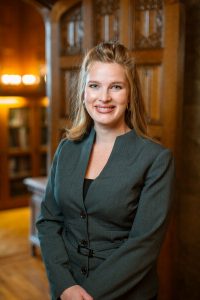Holly Geyer, M.D. (I ’11)
Board Member, Executive Committee
(originally published in 2014)
Division of Hospital Internal Medicine
Assistant Professor of Medicine
Mayo Clinic in Arizona
“Mayo has taught me to view patient care from such a greater perspective — to see the patient as I see myself, as one who struggles to live bereft of ailments that would compromise quality and quantity of existence. Every patient I encounter becomes a reminder that life is precious and fragile.”
- Residency: Internal Medicine, Mayo Clinic School of Graduate Medical Education, Arizona
- Medical School: University of North Dakota School of Medicine & Health Sciences, Grand Forks
- Undergraduate: University of Minnesota, Minneapolis
- Native of: Brooklyn Park, Minnesota
Why did you decide to pursue medicine?
I was raised from the ages of 5 to 10 in South Africa as a missionary within the apartheid-segregated townships. The poverty and health deprivation plaguing the indigenous populations made an impression. When I returned to the U.S., I focused on activities that emphasized the alleviation of suffering. I was fascinated by the basic sciences, and medicine surfaced as the perfect career to align my intellectual curiosities with my passion for service.
Why did you train at Mayo Clinic?
I was resolute in finding an institution that recognized the very reason for its existence within the population it served, empowered that acknowledgement with solid educational activities and advanced its capabilities through ongoing research. Mayo was an obvious choice.
How does Mayo Clinic influence your practice?
Mayo has made every effort to provide me with the best clinical tools, highly trained colleagues and a personable working environment. This inspires me to offer the best of myself to each patient I encounter.
So much of hospital medicine is the practical application of broad disease-based guidelines. In the routine of patient care, however, patients may morph into their diseases, and practitioner treatments resemble rudimentary execution of algorithms.
Mayo has taught me to view patient care from such a greater perspective — to see the patient as I see myself, as one who struggles to live bereft of ailments that would compromise quality and quantity of existence. Every patient I encounter becomes a reminder that life is precious and fragile. I wish to never take for granted the privilege to be a provider that steps in daily to reset the physical equilibrium of health and functionality in an unbalanced system.
What valuable lesson did you learn at Mayo Clinic?
It’s not enough to have good intentions. Our patients depend on us daily to be the intermediate that gets them back to health. From following up on their test results to coordinating their care to ensure their full comprehension of their conditions and treatments, our patients rely on us to take the greatest scientific advances and distill them into quality-driven, reliable care. I want to make every activity performed on their behalf reputable, impactful and accurate. I believe this philosophy is the heartbeat of Mayo.
How do you contribute to the Mayo Clinic Alumni Association?
I hope to inspire the next generation of young medical professionals to train with Mayo and model its most basic constructs as they take their practice back into the world.
What would people be surprised to know about you?
I’m a competition light-rifle shooter.
